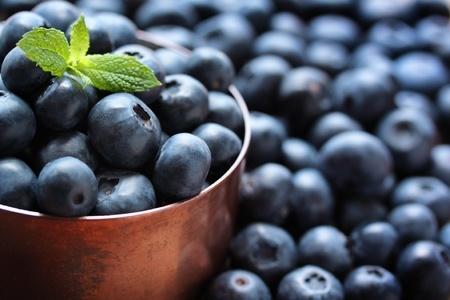5 Things You Didn’t Know About Blueberries (#3 is Impressive!)
Here in North Carolina (and probably along much of the East Coast), once summer rolls around, you’ll see roadside signs advertising a “free-for-all” on berry picking.
The hand-painted signs on pieces of plywood signify summer’s here, and it’s time to battle the bugs and the sun for future enjoyment of sun-kissed fruit.
Some of the most popular berries to pick are blueberries.
Now, here’s the thing about blueberries…not only are they incredibly tasty…they’re also one of the healthiest fruits you can eat.
No joke, blueberries are a king among fruits and vegetables.
Which is why I highly encourage you to eat more of them.
Do keep in mind if you go blueberry picking, eating more than a few handfuls will instantly restore regularity…so just a head’s up.
5 Reasons to Eat Blueberries Every Day
1. Blueberries Are Loaded With Antioxidants:
As you likely know (only because we talk about them so much), antioxidants are extremely important for helping you achieve Health As It Ought To Be.
The reason why is because antioxidants neutralize the threat formed by free radicals in the body.
In terms of antioxidant capacity, the blueberry has one of the highest ORAC (Oxygen radical absorbance capacity – a means of measuring antioxidant capacity in vitro) in the world!
That’s nothing to sneeze at.
I’ll get into the specifics of what this means for your health in reasons 2-5.
Suffice it to say, the higher your food is in antioxidant capacity, the better it is for your health.
In regards to what kinds of blueberries are better for you, organic or conventional, the verdict is clear.
In one study, researchers discovered the organic blueberries had higher levels of total phenol antioxidants and total anthocyanin antioxidants.
This is likely because organic blueberries are forced to grow naturally (as opposed to relatively stress-free like conventional blueberries) which promotes an increase in total antioxidant levels.
2. Blueberries Can Help Protect the Brain:
Here’s the idea behind antioxidant capacity.
The more antioxidants a plant has, the better it is at helping fight inflammation.
Authority Nutrition writes the following on the subject.
Oxidative stress can accelerate the brain’s aging process, having negative effects on brain function.
According to animal studies, the antioxidants in blueberries tend to accumulate in areas of the brain that are essential for intelligence (24, 25).
They appear to directly interact with aging neurons, leading to improvements in cell signaling.
Human studies have also shown promising results.
In one of these studies, 9 elderly participants with mild cognitive impairment consumed blueberry juice every day. After 12 weeks, they had seen improvements in several markers of brain function (26).
A six-year study of 16,010 elderly participants found that blueberries and strawberries were linked to delays in cognitive aging by up to 2.5 years (27).
It’s incredibly encouraging to me, a serious lover of fruits and vegetables, to see blueberries finally being recognized for all the good they do.
3. Blueberries Can Help Muscles Recover Faster After Vigorous Exercise
This is pretty interesting, especially for anyone who regularly engages in frequent and strenuous exercise.
Researchers in New Zealand were able to determine when exercisers participated in exercise and had a blueberry based smoothie both before and after their workout. It helped their muscles recover quicker.
In their studies, they noted, “This effect, although independent of the beverage’s inherent antioxidant capacity, appears to involve an up-regulation of adaptive processes, i.e. endogenous antioxidant processes, activated by the combined actions of the eccentric exercise and blueberry consumption. These findings may benefit the sporting community who should consider dietary interventions that specifically target health and performance adaptation.”
So, in addition to other post-workout meals, it would also be a good idea to get your daily dose of blueberries in for maximum health-boosting impact.
4. Blueberries Are Helpful at Helping Prevent Poor Heart Health:
Blueberries are rich in flavonoids known as anthocyanins.
These compounds are what give blueberries the rich bluish, purple, reddish hue.
And, as you might have learned, when a fruit or vegetable has a deep, rich color, it’s an advertisement to you that the food you’re about to eat is healthy.
In particular, these compounds can help increase endothelial function which is superb for your heart’s health.
And this in turn can help lower your risk of having poor heart health.
One study noted:
Epidemiological studies suggest that increased consumption of anthocyanins lowers the risk of cardiovascular disease (CVD), the most common cause of mortality among men and women.Anthocyanins frequently interact with other phytochemicals, exhibiting synergistic biological effects but making contributions from individual components difficult to decipher.Over the past 2 decades, many peer-reviewed publications have demonstrated that in addition to their noted in vitro antioxidant activity, anthocyanins may regulate different signaling pathways involved in the development of CVD.”
And another study was able to show blueberries can even help reduce blood-pressure!
How about those findings?
Gives you all the more reason to enjoy moderate amounts of blueberries in your diet.
5. Blueberries Have A Low Glycemic Index:
Blueberries are also low in sugar, which makes them another favorable option when it comes to fruit.
Many of the fruits you enjoy, while pretty good for your health, are quite high in sugar.
It’s why I advise against so many of the “healthy fruit juices” being marketed to you as they’re nothing more than the concentrate of fruit sugar.
The good news is that a single cup of blueberries has anywhere from 12-15 grams of sugar (depending on the stage of ripeness). Which isn’t all that much when compared to what a cup of grapes or watermelon would have.
Another added benefit is that blueberries don’t cause insulin levels to soar when ingested since they’re lower on the Glycemic index (most sugary fruits cause blood-sugar to spike).
While the GI of blueberries isn’t nearly as low as blackberries, strawberries, and raspberries, blueberries will consistently register anywhere from 40-53 on the Glycemic Index which is still relatively low.
One of the benefits of a low GI is that it can help keep glucose levels balanced.
As The World’s Healthiest Foods noted;
“A recent study that included blueberries as a low-GI fruit has found that blueberries, along with other berries, clearly have a favorable impact on blood sugar regulation in persons already diagnosed with type 2 diabetes. Participants in the study who consumed at last 3 servings of low-GI fruits per day (including blueberries) saw significant improvement in their regulation of blood sugar over a three-month period of time. (Their blood levels of glycosylated hemoglobin, or HgA1C were used as the standard of measurement in this study.)”
These findings are encouraging and show, when you eat a well-balanced diet full of foods designed to work with your body, it’ll produce a serious uptick in health.
Pretty exciting, wouldn’t you agree?
A Final Note On Blueberries
I’m sure after reading all of those interesting facts about blueberries you might be able to understand why I highly recommend them.
With that being said, here’s what I don’t recommend.
- Pretending eating blueberry jelly is healthy.
- Pretending drinking copious amounts of blueberry juice is healthy.
- Pretending drinking blueberry flavored vodka counts
- Eating too many blueberries (more than a few cups a day), and thinking you’ll beat cancer.
Other than that, I recommend you build a diet around blueberries for the benefit of your health.
That, my friend, is how you experience Health As It Ought To Be.
Talk soon,
Dr. Wiggy
www.HealthAsItOughtToBe.com


